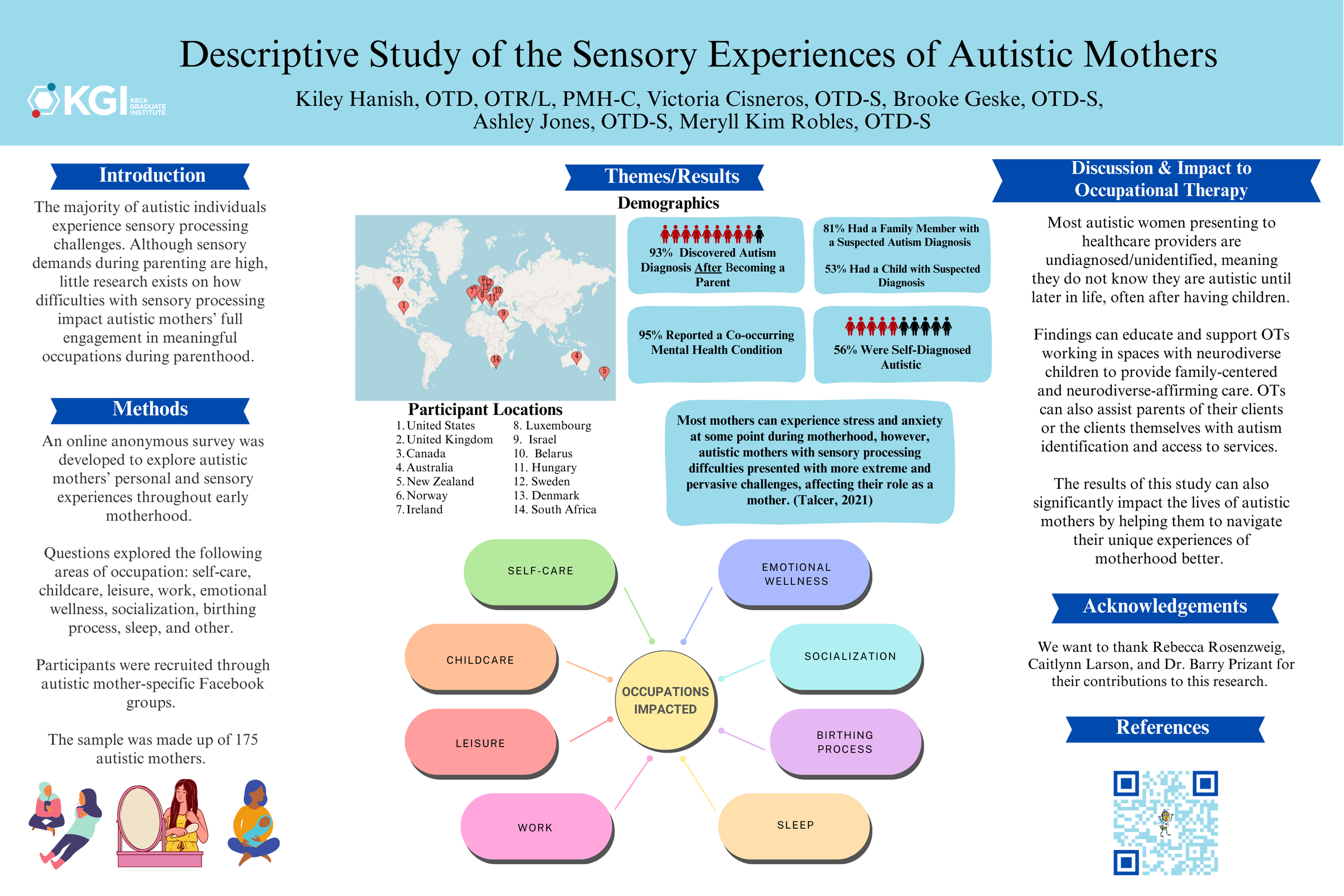Research on Autistic Mothers
This work started as a student research group through the Occupational Therapy Doctorate Program at Keck Graduate Institute in Claremont, CA. Our research groups consists of Victoria Cisneros, Brooke Geske, Ashley Jones, and Kim Robles. A special thanks to Rebecca Rosenzweig for her contributions.
Descriptive Study of the Sensory Experiences of Autistic Mothers: Abstract
Introduction: A majority of autistic individuals experience sensory processing challenges which impact them in their everyday life. Although sensory demands during parenting are high, little research exists on how difficulties with sensory processing impact autistic mothers’ full engagement in meaningful occupations during early parenthood. Most autistic women presenting to healthcare providers are undiagnosed/unidentified, meaning they do not know they are autistic until later in life, often after having children.
Objectives: The purpose of this descriptive study is to explore the sensory experiences of autistic mothers related to early parenting and self-care occupations.
Methods: An anonymous online survey explored the sensory experiences of 175 autistic mothers and the impact on daily occupations throughout early motherhood. Participants were recruited through autistic mother-specific Facebook groups and were both self-diagnosed and clinically diagnosed as autistic.
Results: The results of the study gathered an international sample of individuals who identify as autistic mothers, most of whom had received a diagnosis post-parenthood. The data collected confirmed sensory and other challenges for autistic mothers in several occupational areas: disrupted self-care routines, decrease in mental well-being, disrupted sleep, misalignment between their and their child’s sensory needs, decrease in participation in leisure activities, and guilt and isolation associated with not participating in social situations related to their child. There were striking similarities between the self-diagnosed and clinically diagnosed autistic mothers in relation to sensory challenges and the impact on occupations.
Conclusion: The findings of this study can educate and support occupational therapists working in school-based, pediatric, and primary care settings to provide family-centered and neurodivergent-affirming care. Occupational therapists can also utilize this information to assist parents of their clients or the clients themselves with autism identification and access to services.
References
American Occupational Therapy Association. (2020). Occupational therapy practice framework: Domain and process (4th edition). American Occupational Therapy Association.
Dugdale, A.-S., Thompson, A. R., Leedham, A., Beail, N., & Freeth, M. (2021). Intense connection and love: The experiences of autistic mothers. Autism, 25(7), 1973–1984. https://doi.org/10.1177/13623613211005987
Milner, V., McIntosh, H., Colvert, E., & Happé, F. (2019). A qualitative exploration of the female experience of autism spectrum disorder (ASD). Journal of Autism and Developmental Disorders, 49(6), 2389–2402. https://doi.org/10.1007/s10803-019-03906-4
Pohl, A. L., Crockford, S. K., Blakemore, M., Allison, C., & Baron-Cohen, S. (2020). A comparative study of autistic and non-autistic women’s experience of motherhood. Molecular Autism, 11(3). https://doi.org/10.1186/s13229-019-0304-2
Price, D. (2022). Unmasking autism: Discovering the new faces of neurodiversity (First edition). Harmony Books
Prizant, B., & Fields-Meyer, T. (2022). Uniquely Human (Expanded, Updated Edition). Siman & Schuster.
Talcer, M. C., Duffy, O., & Pedlow, K. (2021). A qualitative exploration into the sensory experiences of autistic mothers. Journal of Autism and Developmental Disorders, 53(2), 834–849. https://doi.org/10.1007/s10803-021-05188-1



